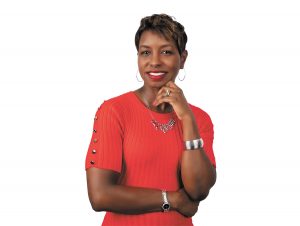Subscriber Benefit
As a subscriber you can listen to articles at work, in the car, or while you work out. Subscribe Now
Tolbert & Tolbert LLC
Valparaiso University School of Law, 2000
Why did you decide to enter the legal profession?
Because I wanted to help people, and being a lawyer allows me to help many different people in many different aspects of their lives, whether it’s personal or business.
What does “diversity, equity and inclusion” mean to you?
DEI means to me that everyone is on equal footing with the same opportunities to have a seat at the table and be heard without being ignored. DEI also means to me that there is a conscious mindset to make sure the perspectives of minorities are given the attention deserved.
How did you get involved in DEI work, and why have you stuck with it?
As a Black woman, I think that I have always been involved in DEI work before the term was coined. I have always had the mindset to make sure that Black people had opportunities in spaces where we were missing but needed and should have a voice because of the effect on the Black community. I have had the same mindset about Black women being recognized and heard.
What would you say to someone who perceives “DEI” as a business “buzzword”?
The phrase itself may be perceived as a business buzzword, but the concept is not. We have consistently been grappling with being heard, being treated equally and being included as minorities for a significant amount of time.
What is the most significant change you’ve seen in the legal profession since you began your career?
I think the most significant change in the legal profession has come with technology. I was in law school in the late 1990s, and we were still doing a significant amount of legal research using books. When I started practicing in 2000, court filings had to be physically taken or mailed via certified mail to the clerk’s office. We used giant poster boards and enlarged pictures or documents in jury trials, which were very expensive and permanent. You couldn’t change a poster board or enlarged document or picture once it was prepared for trial. Technology has changed all this, and the way that we practice.
What’s the best advice you’ve ever received?
Make sure you give your best, no matter what.
How do you spend your free time?
Spending time with my husband, exercising, listening to music, watching television or reading.
What was your favorite — and least favorite — class in law school?
I don’t know if I really had a favorite class in law school, but I did enjoy business organizations, as well as mergers and acquisitions. My least favorite class was tax.
You’ve intentionally built your career in Gary, which has one of the most diverse populations in the state. Why was it important for you to stay in Gary?
My husband, who is my partner, and I made the conscious decision to open our law firm in Gary because God has blessed us to be able to give back to the community that raised us. We want to help build the business community of Gary and provide legal services that are needed by the citizens right in the city where they live.
Tell us about your work with the UNCF Northwest Indiana Leadership Council.
I currently serve as the chair of the Northwest Indiana Leadership Council of the United Negro College Fund. UNCF provides scholarships for minority students all over the country, but our NWI Leadership Council raises funds to provide scholarships for minority students entering college or currently enrolled in college who are residents of NWI, up to $5,000 based on financial need. This is something I am dedicated to because I remember how challenging it was to finance my college education. Any way I can assist minority students to find money for school, I will do my best to get it to them. Our UNCF Northwest Indiana Leadership Council is one vehicle that allows me to do just that.
Please enable JavaScript to view this content.
